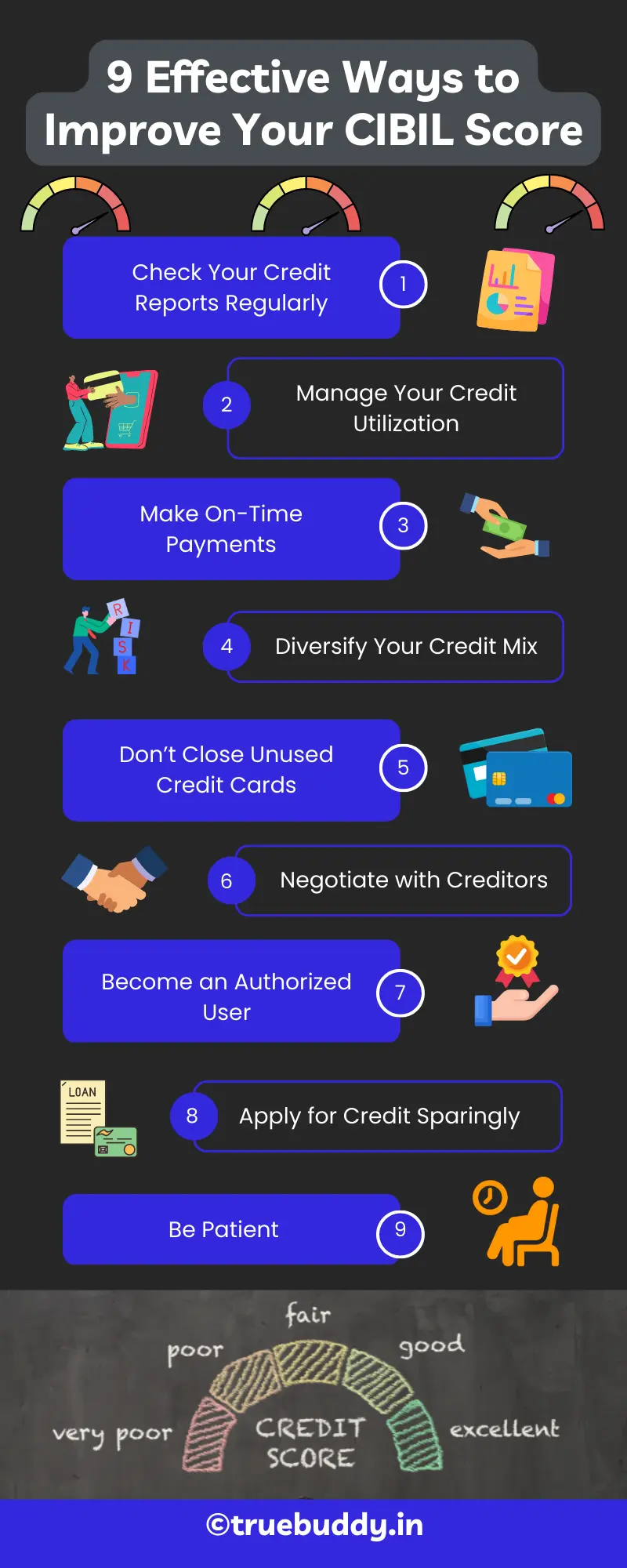Welcome to TrueBuddy
Thank you for visiting my blog on “How to Improve Your CIBIL Credit Score“. We have dedicated a considerable amount of time to researching and compiling this comprehensive guide to help you make an informed decision.
In this blog post, You will read:
- How to Increase CIBIL Score?
- 9 Effective Ways to Boost Your Credit Score
- How to Rectify Cibil Score?
- FAQs on CIBIL Score
If you plan to buy any products, kindly click through my link. We may receive a small commission from the purchase you make without costing you any extra penny.
This commission will help and encourage me to write some more useful articles.
Don’t Forget to Check Out Some of the Best Deals of the Day on Amazon.
Your CIBIL score is a critical factor that lenders use to evaluate your creditworthiness. It is a numerical rating used by lenders in India to assess a borrower’s creditworthiness. It is calculated by the Credit Information Bureau (India) Limited (CIBIL) based on an individual’s credit history, repayment behavior, credit utilization, and other financial factors. It determines whether you can qualify for loans, credit cards, and other financial products and the terms and interest rates offered.
The score ranges from 300 to 900, where a score of 750 or above is considered good and indicates that the borrower has a high chance of getting approved for loans and credit cards. A lower score, on the other hand, indicates a higher credit risk and may lead to higher interest rates or rejection of credit applications.
Maintaining a good CIBIL score is essential for individuals to secure loans and credit easily and on favorable terms.
You may also like:
- How to Invest in SIP Mutual Fund?
- Why ELSS Mutual Fund is the Best Investment Option for Salaried People?
- How to Invest in Mutual Funds Online in India?
- YSense Surveys: Empowering Indians to Earn Money from Home
How to Increase CIBIL Score?
If you’re looking for how to increase cibil score, the good news is that there are several steps you can take to improve it. We’ll explore nine effective ways to boost your CIBIL score, including tips on managing your credit utilization, making on-time payments, and more.

9 Effective Ways to Boost Your Credit Score
1. Check Your Credit Reports Regularly
The first step in improving your CIBIL score is to check your credit reports regularly. Your credit report contains all the information contributing to your CIBIL credit score, including your payment history, credit utilization, and length of credit history. By checking your credit reports regularly, you can identify any errors or inaccuracies that may negatively affect your score.
2. Manage Your Credit Utilization
Your credit utilization is the amount of credit you use compared to your credit limit. Ideally, it would help if you aimed to keep your credit utilization below 30% to avoid negatively impacting your CIBIL score. To manage your credit utilization, you can consider paying down your balances, requesting a credit limit increase, or spreading your spending over multiple credit cards.
3. Make On-Time Payments
Late payments can significantly impact your CIBIL score, so making all your payments on time is essential. You can set up automatic payments or reminders to ensure you never miss a due date. If you miss a payment, it’s best to catch up as soon as possible and avoid letting it go to collections.
4. Diversify Your Credit Mix
A mix of credit types, such as credit cards, auto loans, and mortgages, can positively impact your CIBIL credit score. It demonstrates that you can manage different types of credit responsibly. However, don’t open new credit accounts just for having a mix of credit types, as that can negatively impact your score.
5. Don’t Close Unused Credit Cards
Closing unused credit cards can negatively impact your credit utilization and length of credit history, two essential factors contributing to your credit score. Instead, consider keeping them open and using them occasionally to maintain your credit history and utilization.
6. Negotiate with Creditors
If you’re struggling to make payments or have missed payments in the past, consider negotiating with your creditors. They may be willing to work out a payment plan or settle for a lower amount. This can help you avoid late payments, collections, and charge-offs, significantly impacting your credit score.
7. Become an Authorized User
Becoming an authorized user on someone else’s credit card can help you establish credit and improve your CIBIL score. The account holder’s credit history and utilization will also be factored into your credit score, so make sure they have a good credit history and keep their balances low.
8. Apply for Credit Sparingly
Each time you apply for credit, it results in a hard inquiry on your credit report, which can negatively impact your score. To avoid this, only apply for credit when needed, and avoid applying for multiple credit accounts at once.
9. Be Patient
Improving your CIBIL credit score takes time and patience. It’s essential to consistently follow good credit habits, such as making on-time payments and managing your credit utilization.
But those habits may take several months or even years to impact your score positively. Don’t get discouraged if you don’t see immediate results, keep working on improving your credit, and eventually, your score will rise.
How to Rectify Cibil Score?
If you find errors or inaccuracies in your CIBIL score, you can follow these steps to rectify it:
i. Get a copy of your CIBIL report
You can obtain a copy of your CIBIL score online by visiting the CIBIL website and submitting your personal and financial details.
ii. Review your report
Check your report thoroughly and look for discrepancies or errors, such as incorrect personal information, mistaken loan accounts, or missed payments.
iii. Raise a dispute
If you find any errors, raise a dispute with CIBIL by filling out an online dispute resolution form on their website or emailing their customer care department. You must provide supporting documents, such as loan statements, to support your claim.
iv. Wait for resolution
CIBIL will investigate your dispute and take corrective action if required. They will inform you of the outcome of the dispute resolution process and update your CIBIL report accordingly.
It’s important to note that rectifying your CIBIL score can take time, so it’s advisable to check your credit report regularly to ensure its accuracy and keep your creditworthiness intact.
CIBIL Score: Frequently Asked Questions
Can paying off debt hurt your CIBIL score?
Paying off debt can improve your credit utilization and demonstrate responsible credit behavior, positively impacting your CIBIL credit score. However, paying off a credit account can also lower your average age of accounts, which can negatively affect your score in the short term.
Will my CIBIL credit score improve if I close a credit card account?
Closing a credit card account can negatively impact your credit utilization and length of credit history, two critical factors contributing to your credit score. It’s generally better to keep unused credit cards open as long as you can manage them responsibly.
How often should I check my CIBIL reports?
It’s recommended that you check your CIBIL reports at least once a year, but you can also check them more frequently, especially if you’re actively working on improving your credit.
What is CIBIL score in full form?
The full form of CIBIL score is Credit Information Bureau (India) Limited score. It is a numerical rating used by lenders in India to evaluate the creditworthiness of borrowers based on their credit history and repayment behavior.
Conclusion
Improving your CIBIL score is essential to access better credit options and save money over time. By following these nine effective ways to boost your credit score, you can manage your credit responsibly and demonstrate to lenders that you’re a low-risk borrower. Remember to check your credit reports regularly, manage your credit utilization, make on-time payments, and be patient. Improving your CIBIL credit score takes time, but the benefits are worth the effort.
